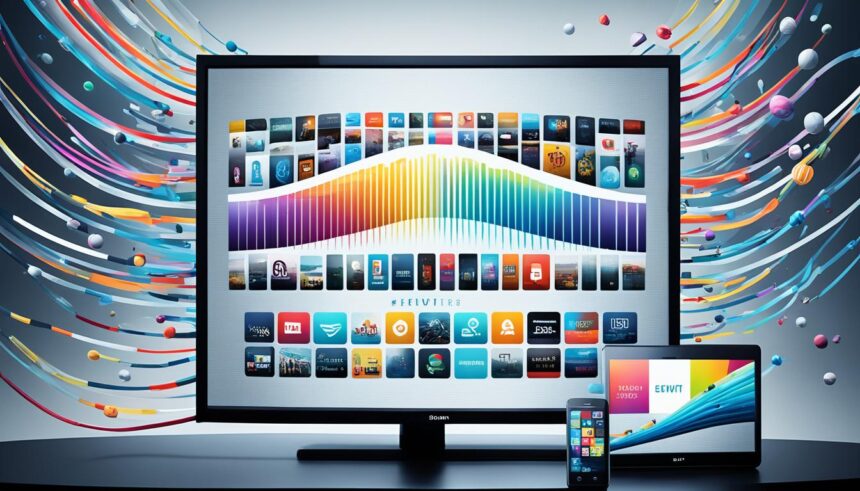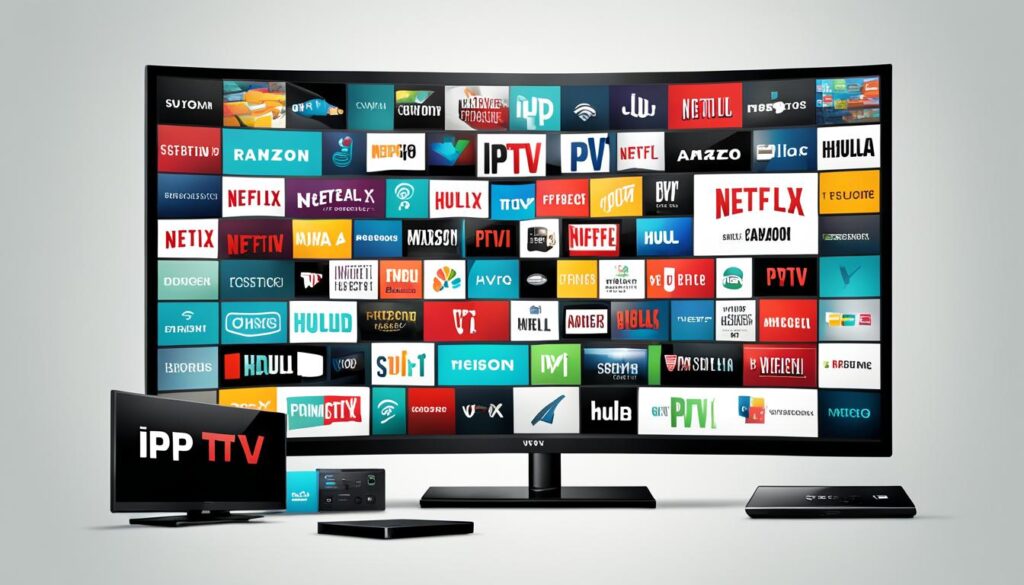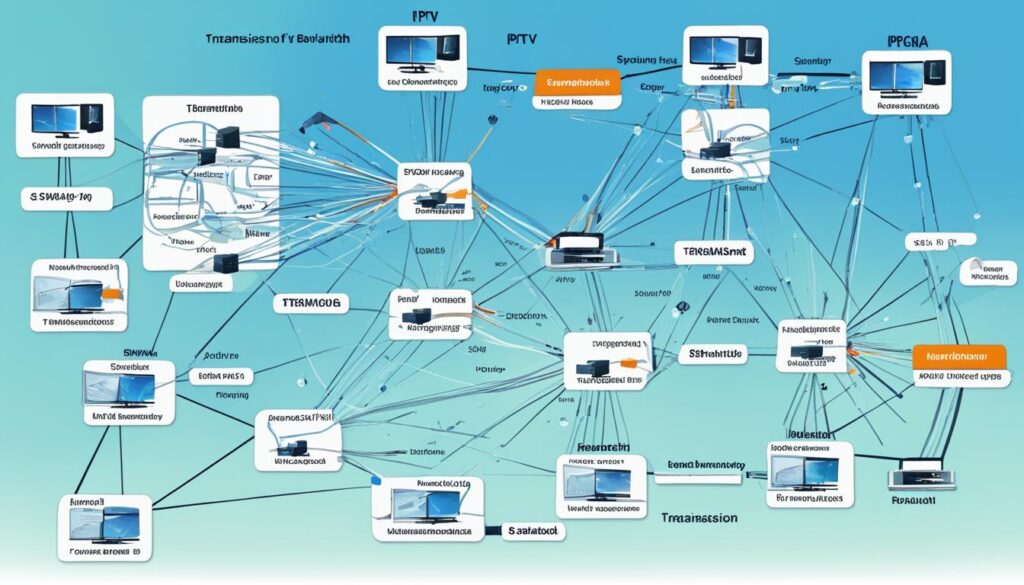IPTV, or Internet Protocol Television, changes how we watch TV. It uses the internet to send live and on-demand shows straight to our devices. This new way of watching TV brings many benefits, like more control over what we watch and a wider choice of shows.
We’ll dive into IPTV in this guide. We’ll cover what it is, how it works, the different services it offers, and its advantages for viewers and the TV industry.
Introduction to IPTV
IPTV, or Internet Protocol Television, is changing how we watch TV and videos. It’s different from old-school broadcast or cable TV. IPTV brings TV, video, audio, text, graphics, and data over the internet. This gives users quality, security, interactivity, and reliability they want.
Definition and Overview
IPTV uses the Internet Protocol to deliver digital TV over networks, often through a broadband connection. It’s not like traditional TV. It uses packets to send content and can be mixed with other internet services like internet access and voice over IP (VoIP).
The IPTV definition covers live TV, video-on-demand (VOD), and more. IPTV Subscription services come from internet providers or IPTV companies. They let users watch content on their internet-connected devices in a way that’s personal and interactive.
| Key Features of IPTV | Benefits |
|---|---|
|
|
Learning about IPTV meaning and its IPTV overview shows how it’s changing TV and video entertainment. It gives users a more personal, interactive, and flexible way to watch content.
How Does IPTV Work?
To understand IPTV (Internet Protocol Television), we need to look at the IPTV technology and protocols behind it. IPTV sends content over a managed network, often using Digital Subscriber Line (DSL) for a reliable and high-quality stream.
IP multicasting is key to IPTV. It uses Internet Group Management Protocol (IGMP) for live TV and Real-Time Streaming Protocol (RTSP) for on-demand shows. On IPv6 networks, Multicast Listener Discovery (MLD) is used. Other protocols like Real-Time Messaging Protocol (RTMP) and Hypertext Transfer Protocol (HTTP) are also important.
IPTV is different from traditional TV because it uses a Unicast format, not Multicast. This means the IPTV service only sends the show you want, within the internet service providers network. This gives you a more personalized viewing experience, letting you watch what you want, when you want.
IPTV Technology and Protocols
- IPTV content is often delivered over a managed or dedicated network, such as Digital Subscriber Line (DSL) connectivity.
- IPTV primarily uses IP multicasting with protocols like Internet Group Management Protocol (IGMP) for IPv4-based live TV and Real-Time Streaming Protocol (RTSP) for on-demand content.
- Multicast Listener Discovery (MLD) is the preferred protocol for IPv6 networks.
- Other common IPTV protocols include Real-Time Messaging Protocol (RTMP) and Hypertext Transfer Protocol (HTTP).
Delivery Methods: Unicast vs. Multicast
Traditional TV sends all shows at once in a Multicast format. But IPTV uses a Unicast format. It sends only the show you pick, keeping it within the internet service providers network.
What is IPTV
IPTV, or Internet Protocol Television, is a new way to watch TV. It uses the internet to send TV shows, unlike old cable or satellite TV. This method gives viewers a more personal and flexible way to watch TV.
Buy Best IPTV Subscription TV Service Provider in USA, UK, Canada
Differentiating IPTV from Traditional TV
IPTV and traditional TV are different in how they send shows and how people watch them. IPTV uses the internet to send shows, while traditional TV uses cables or satellites. This means IPTV can talk back to viewers, offering more interactivity and choices.
IPTV vs. cable TV and IPTV vs. satellite TV also differ in how they work and what they offer. IPTV gives a more personal experience, letting viewers pause, rewind, and choose from lots of shows. Traditional TV can’t offer these things as easily.
| Feature | IPTV | Traditional TV |
|---|---|---|
| Delivery Method | Internet Protocol Network | Analog/Digital Signals via Cable or Satellite |
| Interactivity | Two-way communication, on-demand options | One-way transmission, scheduled programming |
| Personalization | Highly customizable, tailored viewing experience | Limited personalization options |
In summary, IPTV and traditional TV are different in how they send shows, interact with viewers, and let viewers customize their viewing. IPTV’s internet-based system offers a more dynamic and personal TV experience than traditional TV.
Types of IPTV Services
IPTV, or Internet Protocol Television, offers many services for different tastes and viewing habits. It lets you stream live TV or watch shows on demand. Let’s look at the main types: iptv live tv, iptv vod, and iptv catch up tv and time shifted viewing.
Live TV Streaming
IPTV live tv lets you stream live TV channels over the internet. You can watch shows as they air, without needing a cable or satellite box. It’s a smooth way to keep up with news, sports, and shows live.
Video on Demand (VOD)
IPTV vod lets you watch a huge library of shows and movies when you want. You can stream or download content like movies, TV shows, and web series. This means you can watch what you like, on your schedule.
Catch-Up TV and Time-Shifted Viewing
IPTV catch up tv and time-shifted viewing let you watch shows you missed. You can rewatch, pause, and resume content anytime. This feature gives you more control over your TV watching.
These three IPTV services – iptv live tv, iptv vod, and iptv catch up tv and time shifted viewing – show how IPTV lets you customize your TV watching. You can choose how and when you watch your favorite shows.
IPTV Providers and Platforms
The IPTV world is filled with many IPTV service providers and platforms. Each one offers special features and capabilities. Major networks and streaming giants are always adding new options for viewers.
Big names like Verizon with FiOS and tech leaders Netflix, Google, Apple, Microsoft, Sony, Roku, Hulu, and YouTube are well-known. But there are also many specialized iptv service providers. They meet different viewer needs and tastes.
- IPTV Subscription TV
- FalconTV
- SelectTV
- Best Cast TV
- Comstar.tv
- Xtreme HD IPTV
- Apollo Group TV
- Bing TV
- Decoded Streams
- Hoopla
- Hotstar
- HUTV
- Iconic Streams
- IMDb TV
- IPTVGang
- IPTV Trends
- Kanopy
- King TV
- Kodi
- StreamTVUniverse
- Necro IPTV
- nVision TV
- Perfect Player
- Players Klub IPTV
- Popcornflix
- RocketStreams
- Snap.tv
- Sportz TV
- Tubi
- Vudu
- YeahIPTV
This variety of iptv platforms and iptv providers means viewers have lots of choices. They can pick what fits their viewing habits and content likes best. As IPTV grows, viewers will have even more ways to watch their favorite shows and movies.
Benefits and Advantages of IPTV
Internet Protocol Television (IPTV) changes the way we watch TV. It offers personalized viewing, more interaction, and on-demand content. This makes watching TV more fun and flexible.
Personalized Viewing Experience
IPTV gives you a viewing experience that’s all about you. It uses your viewing history and preferences to suggest shows and movies you’ll like. This means you get to watch what you want, when you want it.
Interactivity and On-Demand Options
IPTV also lets you interact with your TV in new ways. You can pause, rewind, and restart live TV. This makes watching TV more flexible. Plus, you can watch a huge selection of movies and shows whenever you want.
These features make IPTV a top choice for those who want a more personal and interactive TV experience.
| Feature | Benefit |
|---|---|
| IPTV personalized viewing | Tailored content and recommendations based on user preferences and behavior |
| IPTV interactivity | Two-way communication with TV provider, enabling features like pause, rewind, and restart of live TV |
| IPTV on demand | Access to a vast library of on-demand content, allowing users to watch at their convenience |
IPTV vs. Traditional Cable and Satellite TV
IPTV and traditional TV services like cable or satellite TV are quite different. Traditional TV sends content through signals over cable or satellite. IPTV, on the other hand, uses the internet to deliver shows and movies.
This difference means IPTV can give you a more personal and flexible way to watch TV. You can talk back to the TV provider with IPTV, making it more interactive. This lets you watch shows when you want, unlike traditional TV’s set schedules.
| Feature | IPTV | Cable TV | |
|---|---|---|---|
| Delivery Method | Internet Protocol (IP) network | Coaxial cable network | |
| Interactivity | Highly interactive, with two-way communication | Limited interactivity, typically one-way communication | |
| On-Demand Content | Extensive on-demand options, including live TV, catch-up, and video-on-demand | Limited on-demand content, often requiring additional fees | |
| Personalization | Highly personalized viewing experience, with recommendations and customization | Limited personalization options |
The main differences between IPTV vs. cable TV and IPTV vs. satellite TV are in how they deliver content, how interactive they are, and what on-demand options they offer. IPTV uses the internet for a more dynamic and user-focused TV experience. Traditional TV services, however, have fewer features and options.
IPTV Hardware and Setup Requirements
When it comes to IPTV, the right hardware and setup are key for a smooth experience. Traditional IPTV needs a set-top box or devices like a Wi-Fi router or fiber optic/broadband internet. These help get and show the encoded TV content in the MPEG transport stream.
Now, IPTV hardware has changed. Many modern IPTV services have apps for smart TVs, streaming devices like Amazon Fire TV, mobiles, and computers. This means you might not need extra IPTV gear.
The main IPTV hardware and setup needs are:
- IPTV set-top box or a compatible smart TV, streaming device, or mobile device
- Stable and fast IPTV gear, like a Wi-Fi router or fiber optic/broadband internet
- Right setup of the IPTV hardware and network for smooth streaming
| IPTV Hardware | Description |
|---|---|
| IPTV set-top box | A device that connects to the TV and internet. It lets users access IPTV services and content. |
| Wi-Fi router | Provides a wireless internet connection. This is key for IPTV streaming. |
| Fiber optic/broadband internet | Fast internet ensures smooth IPTV playback and cuts down on buffering. |
Knowing what IPTV hardware and setup you need helps users get a great IPTV experience. Whether you pick a traditional IPTV set-top box or a newer app-based option, you’ll enjoy your shows.
Legality and Copyright Issues
The legality of IPTV (Internet Protocol Television) services is complex and often debated. Some IPTV providers share copyrighted content without the right permissions. This leads to IPTV legal issues and copyright concerns. Governments and internet providers watch what we do online. If you stream copyrighted content without okay, you could face big legal consequences.
IPTV users need to know about the legal and copyright issues with some IPTV USA services. Using a VPN (Virtual Private Network) can protect your online actions and lower the risk of IPTV piracy.
Some IPTV providers say they are legal and legit, but it’s not always true. Content owners and regulators might sue IPTV providers and users for sharing copyrighted stuff without permission.
Before joining any IPTV service, check their reputation, licensing, and legal status. Picking a reputable and licensed IPTV Subscription Service Provider ensures a safe watch. It also helps avoid legal issues and copyright infringement.
| Legal IPTV Services | Illegal IPTV Services |
|---|---|
| Operate with proper licensing and content agreements | Distribute copyrighted content without authorization |
| Comply with local and international copyright laws | May face legal action from content owners and regulators |
| Provide a safe and secure viewing experience for users | Put users at risk of legal consequences for IPTV piracy |
Future of IPTV and Internet TV
The world of entertainment is always changing, and IPTV (Internet Protocol Television) and internet TV are no exception. With new technology, the future of iptv and future of internet tv are set to bring new solutions and better experiences for users.
Emerging Trends and Innovations
Several important trends and innovations are changing the iptv trends and iptv innovations for the future:
- Improved Connectivity and Video Quality: Faster internet speeds and more bandwidth will lead to better video quality. This means higher resolutions, smoother playback, and more immersive experiences.
- Increased Integration with Smart Home Technologies: IPTV will work better with other smart home devices. Users will be able to control their entertainment and access services from one place.
- Advancements in iptv technology advancements: Cloud-based platforms and 5G networks will improve IPTV. They will offer scalable and responsive services with lower latency and more flexibility.
- Personalized and On-Demand Content: IPTV and internet TV will give users more control over what they watch. They will offer content that matches their preferences and viewing habits.
These trends and innovations in the future of iptv and future of internet tv will change how we watch entertainment. They will bring more convenience, personalization, and interaction for viewers.
Conclusion
IPTV is a way to watch TV shows and videos over the internet. It gives a more personal and flexible way to watch TV than old cable or satellite TV. It uses different technologies to offer live TV, on-demand videos, and watching shows at any time.
The internet is always getting better, so IPTV will keep getting new features and improvements. This will change how we watch TV and interact with it. The summary of iptv, what is iptv, and iptv overview in this article show how this technology is changing TV and entertainment.
IPTV lets you watch TV in a way that suits you, with options to watch shows whenever you want. As it keeps getting better, we can expect even more cool features and services. These will make watching TV even more fun.
FAQ
What is IPTV?
IPTV is a way to watch TV shows and videos over the internet. It uses the internet’s TCP/IP suite, not traditional TV signals. IPTV services give you live TV or on-demand videos through IP networks.
How does IPTV work?
IPTV uses IP multicasting for live TV and Real-Time Streaming Protocol for on-demand videos. It also uses Real-Time Messaging Protocol and Hypertext Transfer Protocol. This makes sure your shows stream smoothly.
What are the different types of IPTV services?
IPTV comes in three main types: Live TV, Video on Demand (VOD), and Catch-Up TV. Live TV lets you watch shows as they air. VOD lets you watch shows when you want. Catch-Up TV lets you watch shows that aired earlier.
Who are some of the IPTV providers and platforms?
Many companies offer IPTV services. Verizon has FiOS video, and Netflix, Google, and Apple are big names too. Other popular services include Amazing TV, FalconTV, and SelectTV.
What are the benefits of IPTV?
IPTV gives you a more personal viewing experience. You can watch shows when you want and interact with them more. It’s all about watching what you like, when you like.
How is IPTV different from traditional cable and satellite TV?
IPTV uses the internet to deliver TV shows, unlike traditional TV which uses cables or satellites. This means IPTV can offer more personalized viewing and flexibility. It also allows for two-way communication between you and the TV provider.
What are the legal and copyright issues with IPTV?
Some IPTV services might not have the right to show certain shows. Watching these without permission is illegal. It’s important to know the risks and choose legal IPTV services.
What is the future of IPTV and internet TV?
The future of IPTV looks bright with better internet and cloud technology. We’ll see more personalized content and faster streaming thanks to 5G networks. These changes will make watching TV even better.





